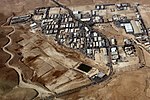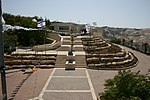Kfar Adumim

Kfar Adumim (Hebrew: כְּפַר אֲדֻמִּים, lit. 'Village of The Red') is a mixed religious-secular Israeli settlement in the West Bank. It is located in the Judean Desert, on the southern bank of Wadi Qelt, about 2 miles northeast of the town Ma'ale Adumim. It is at 367 meters above sea level. It is organized as a community settlement and falls under the jurisdiction of Mateh Binyamin Regional Council. In 2021 it had a population of 4,927. The Israel Central Bureau of Statistics counts the populations of nearby settlements Alon and Nofei Prat as part of the population of Kfar Adumim. The international community considers Israeli settlements in the West Bank illegal under international law, but the Israeli government disputes this.
Excerpt from the Wikipedia article Kfar Adumim (License: CC BY-SA 3.0, Authors, Images).Kfar Adumim
HaShita,
Geographical coordinates (GPS) Address Nearby Places Show on map
Geographical coordinates (GPS)
| Latitude | Longitude |
|---|---|
| N 31.823888888889 ° | E 35.335 ° |
Address
השיטה
HaShita
Judea and Samaria, Palestinian Territories
Open on Google Maps









